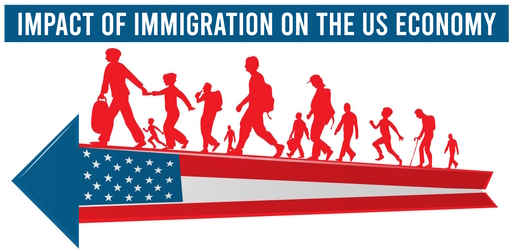Impact of Immigration on the US Economy
Immigration has been a topic of debate in the United States for decades. The topic of immigration touches on several issues including social, political, and economic aspects. In this article, we will focus on the impact of immigration on the US economy. We will explore the effects of immigration on various sectors of the economy and discuss the arguments for and against immigration policies.

Table of Contents
Short-Term Impact of Immigration on the US Economy
The short-term impact of immigration on the US economy can be both positive and negative. Some of the effects are:
Supply of Labor
Immigrants who enter the job market can increase the supply of labor, leading to increased competition for jobs and lower wages. This is especially true in low-skilled jobs such as those in agriculture, construction, and service industries. However, the overall impact of immigration on the wages of native-born workers is small. Studies show that immigration has a minimal effect on the wages of native-born workers in high-skilled industries. In fact, some studies show that immigration has a positive impact on wages in high-skilled industries.
Increased Consumer Demand
Immigrants create demand for new businesses such as ethnic restaurants, grocery stores, and retail stores that cater to immigrant communities. This increased demand can stimulate economic growth and create jobs in these industries.
Example: According to a report by the Partnership for a New American Economy, immigrants in the United States were responsible for starting 28% of all new businesses in 2011, generating $775 billion in revenue.
Public Services
Immigrants can place a burden on public services such as healthcare and education. This is because many immigrants have limited access to healthcare and education, which can result in increased costs for public services.
Example: According to a report by the Center for Immigration Studies, in 2012, 63% of households headed by non-citizens used at least one welfare program, compared to 35% of households headed by native-born citizens.
Long-Term Impact of Immigration on the US Economy
The long-term impact of immigration on the US economy can be positive. Immigrants can contribute to economic growth and increased innovation by bringing new skills, ideas, and entrepreneurial spirit that can help drive innovation and create new industries. Some of the effects are:
Economic Growth
Immigrants contribute to the US economy by working in high-skilled industries such as science, technology, engineering, and mathematics (STEM) fields. Immigrants also start new businesses that create jobs and stimulate economic growth.
Example: In 2017, immigrants were responsible for creating one in four new businesses in the United States, according to a report by the National Foundation for American Policy.
Increased Innovation
Immigrants can bring new skills, ideas, and entrepreneurial spirit that can help drive innovation and create new industries. Immigrants are more likely to hold advanced degrees in science and engineering fields than native-born Americans, and they contribute to innovation in these fields.
Example: Sergey Brin, the co-founder of Google, was born in the Soviet Union and immigrated to the United States with his family when he was six years old. He went on to attend Stanford University, where he met Larry Page, and together they developed the Google search engine. Google has since become one of the most innovative and influential companies in the world, transforming the way we access and use information. Brin’s immigrant background and his experiences as a newcomer to the United States undoubtedly played a role in his success and his ability to think creatively and outside the box.
Demographic Trends
Immigrants can help offset the negative effects of an aging population by contributing to a younger and more diverse population. This can help increase economic growth and productivity.
Example: According to a report by the National Academies of Sciences, Engineering, and Medicine, immigrants are projected to account for 82% of the growth in the US working-age population by 2050.
Impact of Immigration on the Federal Budget
Immigrants contribute to the economy through their work and taxes, but they also place a burden on social services and entitlement programs. The impact of immigration on the federal budget can be positive or negative. Some of the effects are:
Positive Impact on the Federal Budget
Immigrants contribute to the federal budget by paying taxes. Immigrants paid an estimated $405 billion in federal taxes in 2017, according to a report by the New American Economy. Immigrants also contribute to the Social Security and Medicare programs, which helps offset the costs of an aging population.
Example: According to a study by the Kauffman Foundation, immigrants started 29.5% of all new businesses in the United States in 2019, despite comprising only 13.5% of the population. This results in more tax revenue for the federal government and helps to stimulate the economy..
Negative Impact on the Federal Budget
Immigrants can also place a burden on social services and entitlement programs. This is especially true for undocumented immigrants who are not eligible for most government benefits but still use public services such as emergency healthcare and public schools. In addition, immigrants who receive public assistance can increase the costs of entitlement programs.
Example: According to a report by the Center for Immigration Studies, in 2012, the cost of providing public services to immigrants and their children exceeded the amount of taxes they paid by $54.5 billion.
Arguments for and against Immigration Policies
There are various arguments for and against immigration policies in the United States. Some of the arguments are:
Economic Benefits
Proponents of immigration argue that immigration can benefit the US economy by increasing the supply of labor, creating jobs, and stimulating economic growth.
Example: In 2018, a group of more than 1,400 economists signed a letter urging policymakers to reform immigration policies to benefit the US economy.
National Security
Opponents of immigration argue that immigration can pose a threat to national security by allowing terrorists and criminals to enter the country.
Example: In 2017, President Trump signed an executive order temporarily banning immigrants from seven Muslim-majority countries, citing national security concerns.
Social and Cultural Impacts
Opponents of immigration argue that immigration can lead to social and cultural changes that can negatively affect American society.
Example: In 2018, a group of conservative activists formed the group “Keep America Safe and Secure” to advocate for stricter immigration policies to preserve American culture.
Conclusion
Immigration has a significant impact on the US economy, both in the short-term and long-term. Immigrants can contribute to economic growth and innovation by bringing new skills, ideas, and entrepreneurial spirit. However, immigration can also place a burden on public services and entitlement programs. The debate over immigration policies in the United States is likely to continue, but it is important to consider the economic, social, and political implications of immigration when making policy decisions.


